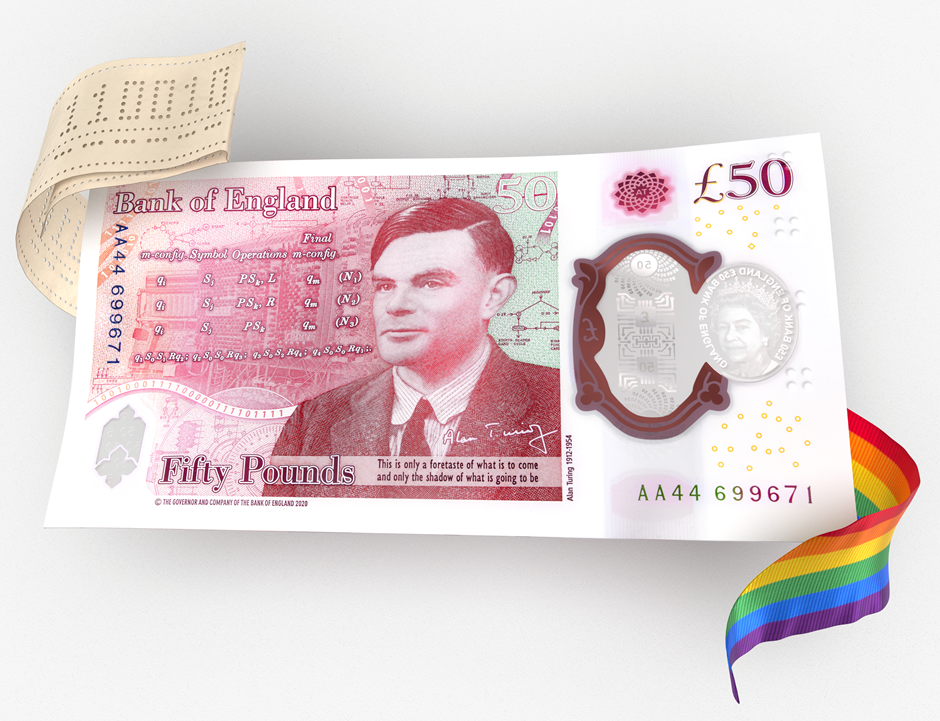Our mission to make business better is fueled by readers like you. To enjoy unlimited access to our journalism, subscribe today.
The Bank of England’s latest banknote design is—pardon the pun—notable for two things.
First, the new £50 bill is the first banknote in the U.K.’s history to feature a known gay man: Alan Turing, the mathematician and early computer scientist whose code-breaking helped defeat the Nazis in World War II.
Second, the new version of the U.K.’s highest-value bill is the last of the English banknotes to make the transition from paper to polymer—a shift that should help combat counterfeiting.
Turing’s selection for the honor took place in 2019, but the actual design of the new £50 was unveiled only on Thursday, when the Bank of England also announced that circulation starts on June 23. The other bills in the central bank’s “Series G” line rolled out from 2016, starting with the £5 (Winston Churchill). The new £10 (Jane Austen) appeared in 2017, then the £20 (J.M.W. Turner) last year.
Alan Turing, who was born in 1912, was one of the leading lights at Bletchley Park, the then-covert code-breaking station at which the ciphers of Germany’s Enigma machine were broken—largely thanks to his statistical techniques. Technical drawings for the Bombe code-breaking machine that Turing specified are also depicted on the new banknote.
After the war, he did crucial work on early computers and devised the now-iconic (though enduringly controversial) Turing test for artificial intelligence: If a human conversing with an A.I. cannot tell they’re talking to an A.I. rather than a person, the machine is “intelligent.”
However, in 1952 Turing was convicted of homosexuality, which was illegal at the time, and he agreed to hormonal treatment as an alternative to jail. The treatment rendered him impotent. Turing killed himself in 1954.

“Turing is best known for his codebreaking work at Bletchley Park, which helped end the Second World War,” said Bank of England Governor Andrew Bailey in a Thursday statement. “However in addition he was a leading mathematician, developmental biologist, and a pioneer in the field of computer science. He was also gay, and was treated appallingly as a result. By placing him on our new polymer £50 banknote, we are celebrating his achievements, and the values he symbolizes.”
Jeremy Fleming, the director of the GCHQ spy agency, said Turing’s appearance on the note “confirms his status as one of the most iconic LGBT+ figures in the world.”
“Turing was embraced for his brilliance and persecuted for being gay,” Fleming continued. “His legacy is a reminder of the value of embracing all aspects of diversity, but also the work we still need to do to become truly inclusive.”
As for the switch from paper to polymer, Bank of England chief cashier Sarah John said in the statement that the new bills are “much harder to counterfeit.” The new series also has several other anti-counterfeiting features, including a metallic hologram that shows different words (“Fifty” and “Pounds” in this case) depending on the angle at which the note is held.
Polymer notes are also supposed to be longer-lasting than their paper predecessors.
According to the Bank of England’s statistics, there are fewer of its £50 notes in circulation—351 million in 2020—than any of the smaller denominations. The most prevalent denomination is the £20, of which 1.86 billion were in circulation last year.
The Bank of England is not the only organization that gets to issue banknotes in the U.K. In Scotland and Northern Ireland, provincial banks such as the Royal Bank of Scotland (RBS) and Bank of Ireland also print them.
All British banknotes should in theory be accepted anywhere in the U.K., but good luck getting an English shop to accept—or in many cases even recognize—a note from one of the other British nations.











